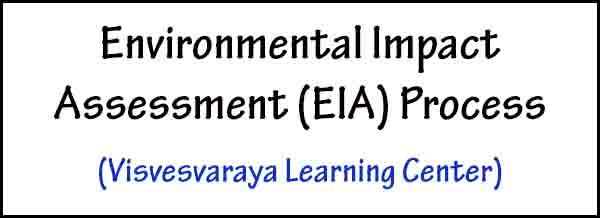Here you will get all details about “Environmental Impact Assessment (EIA) and its Process”. We have listed whole process in detail here. You will get complete knowledge about Environmental Impact Assessment (EIA) here. Keep Visiting – Vlcinfo

Environmental Impact Assessment (EIA)
EIA is a process which is used to identify, predict and assess the positive and negative impacts of a proposed activity, project, plan, program or policy on the environment and human-being. It is used to identify the environmental, social and economic impacts of a project, plan, program or policy prior to any decision-making.
Environmental Impact Assessment (EIA) Process
Here we have described the whole process of Environmental Impact Assessment (EIA).
| EIA Process | Definition | Purpose |
|---|---|---|
| Screening | Identify the project’s characteristics, location and potential impacts | Determine whether a project requires a full EIA or partial impact assessment study |
| Scoping | Identifying the key environmental components and issues that need to be considered in the assessment | It helps in focusing the assessment on the most relevant issues, reducing the scope of the study to manageable proportions |
| Baseline Study | A baseline study involves collecting data on the existing environmental conditions of the project area before any activities begin. | It provides a basis for comparing future changes and helps in identifying potential impacts |
| Impact Prediction | Impact prediction involves estimating the likely environmental, social and economic impacts of the proposed project based on the project’s characteristics and the baseline study | It helps in understanding the potential consequences of the project and informs decision-makers and stakeholders. |
| Mitigation and Alternatives | The identification of measures to avoid, minimize or compensate for adverse impacts and the consideration of alternative project designs or locations | Mitigation measures aim to reduce or eliminate negative impacts and alternative analysis allows decision-makers to choose the most environmentally sound option |
| Environmental Management Plan (EMP) | The EMP outlines the measures and actions to be implemented during and after the project to manage and mitigate environmental impacts | It serves as a guide for project implementation to ensure that environmental protection measures are integrated into the project activities |
| Public Participation | EIA encourages the active involvement of the public, stakeholders and affected communities in the decision-making process | Public participation ensures that diverse perspectives are considered and it enhances transparency and accountability in the decision-making process |
| Decision-Making | Decision-making on whether to approve the project or not or modify the proposed project and under what condition | Decision-makers use the EIA results to make informed choices that balance economic development with environmental and social considerations |
| Monitoring and Auditing | Monitoring involves tracking the project’s environmental performance during and after implementation. And Auditing involves periodic reviews to assess compliance with the environmental management plan | Continuous monitoring and auditing ensure that the project remains in compliance with environmental standards and that corrective actions are taken if necessary |
